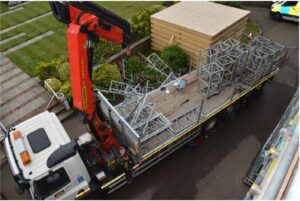Councils’ asbestos management to be assessed during inspection campaign
Hundreds of inspections at council buildings will be carried out by the Health and Safety Executive (HSE) to check councils are managing the risk of asbestos properly.
HSE inspectors will visit the head offices of dozens of councils across the country to ensure asbestos risks are being managed effectively to keep people safe. Each council visit will see inspections take place at several different sites within each local authority’s property portfolio. This work continues previous inspection campaigns that targeted hospitals and schools.
The inspections will assess how local authorities are managing the risks from asbestos within their buildings and meeting the ‘duty to manage’ (DTM) requirements under Regulation 4 of the Control of Asbestos Regulations 2012 (CAR).
The duty to manage asbestos covers a wide range of buildings, some regulated by HSE and others regulated by our colleagues in local authorities. These visits will look at asbestos management in public buildings, including libraries, museums and leisure centres.
People who visit or work in these buildings will not be exposed if asbestos is properly managed. But it can become dangerous when disturbed or damaged.
HSE launched The Asbestos – Your Duty campaign in January 2024 to reach those responsible for maintenance and repair of non-domestic buildings built before the year 2000 to raise awareness of the legal duty to manage asbestos in buildings.
Helen Jones, HSE’s Head of Health and Public Services Sector, said: “Local authorities have a hugely important role to play in keeping people safe.
“They can do this through the maintenance of their property portfolios and in their role as a regulator.
“To keep people safe from its harms, a culture of safely managing asbestos is needed in our building industry and among those responsible for buildings.
“Asbestos exposure in Great Britain is still the single greatest cause of work-related deaths due to exposures decades ago.
“Together, we must protect people in the workplace and reduce future work-related ill health.”
“Those responsible for the maintenance of buildings must do everything to comply with the law and prevent exposure to this dangerous substance, which was widely used in post-war construction before it was completely banned in 1999.
Premises built before the turn of the century, and especially those between 1950 and 1980, when the use of asbestos in construction was at its peak, must carry out the necessary checks, understand their legal responsibilities and actively manage any asbestos they are responsible for.
HSE will check how asbestos is managed when visiting a range of buildings across council stock ensuring they have the right arrangements in place.
HSE inspectors, will contact the local authority before visiting to arrange a suitable date and time for the inspection.
Background
What should local authorities (LAs) do to prepare for these inspections?
In advance of the inspections, LAs may wish to review their current arrangements and check that they are meeting their duties under CAR, which includes requirements to:
- take reasonable steps to find out if there are asbestos-containing materials (ACMs) in their buildings, and if so, the amount, where it is and what condition it is in
- presume materials contain asbestos unless there is strong evidence that they do not
- make, and keep up to date, a record of the location and condition of any ACMs – or materials which are presumed to contain asbestos
- assess the risk of anyone being exposed to fibres from the materials identified
- prepare an asbestos management plan (AMP) that sets out in detail how the risks from these materials will be managed
- take the necessary steps to put the plan into action
- periodically review and monitor the plan and the arrangements, and act on the findings, so the plan and arrangements remain relevant and up to date
- provide information on the location and condition of the materials to anyone who is liable to work on, or disturb them
Notes to editors:
- The Health and Safety Executive(HSE) is Britain’s national regulator for workplace health and safety. We prevent work-related death, injury and ill health through regulatory actions that range from influencing behaviours across whole industry sectors through to targeted interventions on individual businesses. These activities are supported by globally recognised scientific expertise.
- The Asbestos – Your Duty campaign aims to raise awareness of the risks of asbestos. Free resources are available here: https://workright.campaign.gov.uk/campaigns/asbestos-your-duty-campaign-assets/ and a video about asbestos inspections is available here: https://www.youtube.com/watch?v=BsVp1l4COeU.
- Information on where asbestos can be found is available on HSE’s website.
- Further details on the latest HSE news releases is available.

